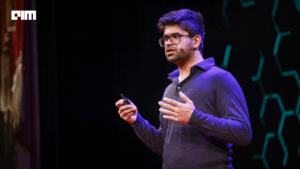“If you’re not embarrassed by your first version, you shipped too late in AI,” says Flo Crivello, founder and CEO of Lindy. “And if your first version works, you’re probably not thinking big enough.”
That shaped the earliest days of Lindy, a no-code platform that lets users build AI agents using modular blocks without writing code. The company’s goal is to help teams automate complex tasks, from handling customer support tickets to generating Salesforce updates based on meeting transcripts. It’s not just about chat interfaces; Lindy’s agents are designed to perform actual work across systems using structured logic and dynamic knowledge sources.
Excited to announce Lindy's biggest update yet:
— Flo Crivello (@Altimor) April 2, 2025
* Agent swarms let Lindy AI agents duplicate themselves and do 100s of things at once
* Integration supremacy: we are now the #1 agent in the world with the most integrations, with 5,000+ integrations and 4,000+ web scrapers pic.twitter.com/SlVpzB9IZd
Crivello describes the first iteration of Lindy as “just a prompt.” No logic engine. No branching. Just text. “It didn’t work. We were relying on models that weren’t ready,” he said. “But we kept going, because we knew future models would catch up to the vision.”
Today, Lindy is live with enterprise customers and has introduced a mobile app for iOS and Android, enabling users to assign tasks, transcribe voice, and receive notifications across devices. Crivello says the company has quintupled its revenue over the past six months and doubled its team.
From Spatial Zoom to AI Automation
Before Lindy, Crivello was building something entirely different: Teamflow, a virtual office platform that gained traction during the remote-work boom of 2020. Inspired by a blog post on spatial interfaces, he launched a browser-based product where video tiles moved freely on a digital canvas. Teamflow attracted users, raised funding, and grew quickly.
But the post-pandemic shift back to offices stalled growth. “We started to see that even well-funded competitors weren’t growing,” he said. “It was a clear signal that the virtual office category wasn’t going to last.”
At the same time, OpenAI released its GPT-3 API. Crivello and his team built a meeting recorder and summarizer inside Teamflow. When their sales team asked if the AI could also update Salesforce records, it triggered a new line of thinking: could AI agents manage not just notes, but entire workflows?
“That was the moment we started experimenting with API automation,” Crivello said. “We realized this was much bigger than just meeting notes.”
In 2023, the company made a clean shift. Teamflow was shut down, and all efforts were redirected toward what would become Lindy.
What Lindy Does
Lindy provides a visual interface for creating AI agents capable of performing actions based on logic, triggers, and external data sources. Its modular system includes building blocks such as conditional logic for if/else decision-making, integration with knowledge bases like FAQs, websites, PDFs, or Notion documents, and the ability to trigger API calls to tools like Salesforce or Slack. It also supports memory and context retention to inform future responses. A prominent use case is customer support, where an agent can classify incoming tickets, retrieve relevant answers from documentation, and respond autonomously via email. The platform is designed to be extensible: “You don’t need to know how to code,” said Crivello. “But if you do, you can plug in your own logic or APIs. It’s like building a team of AI interns that eventually graduate into AI employees.”
A Mobile Experience and Healthcare Surprise
One of Lindy’s more unexpected developments came from its users. Soon after launch, customers began asking if the product could be HIPAA compliant. Crivello was puzzled. “We weren’t targeting healthcare. But doctors started using Lindy to create SOAP notes—structured medical notes—by recording patient conversations and prompting the agent to generate formatted summaries.”
This use case led to upgrades in privacy compliance and recording features. “It showed us that people will use this kind of tool wherever repetitive, document-heavy work exists,” he said.
The recently launched mobile app reflects that reality. It allows users to record conversations in real time, transcribe voice inputs, and stay updated with task notifications across devices. “Everyone wanted to use their assistant on the go,” Crivello said.
The Soham Parikh Incident
In early 2024, Lindy became one of several startups misled by software engineer Soham Parikh, who was working at multiple companies simultaneously without disclosure. “He worked with us for two weeks,” said CEO Flo Crivello. “We paid him, but the impact was negative. Our team had to onboard him, and it ended up wasting time and money.”
Crivello says Parikh never offered a direct apology, despite claiming he would. “If you want to make things right, you give the money back. That didn’t happen either.”
The incident prompted broader questions around trust in startup hiring. “Silicon Valley runs on trust,” Crivello said. “If we overcorrect because of one bad actor, we risk slowing down everything.”
Parikh’s outreach had been convincing, personalized emails, strong technical interviews, and fast onboarding. But for Crivello, the issue wasn’t the model of engagement. “He wasn’t honest. If he had just said he was a contractor, that’s a different conversation. But he lied.”
Building for the Long Game
Crivello’s current focus is scaling Lindy as models improve. While current versions of Claude and GPT can handle basic tasks, many of Lindy’s long-term capabilities are tied to future model improvements.
“Right now, Lindy can handle step-by-step processes,” he said. “But we’re building toward something more autonomous, AI agents that can behave like real team members.”
He’s equally clear about leadership. “The job of a CEO is to win,” Crivello said. “It starts with hiring. I spent seven hours writing an 18-page onboarding document for one new hire. Micromanagement isn’t a bad word, it’s how you maintain quality.”
In a space full of speculative demos and fast pivots, Lindy is positioning itself as an execution-focused platform: less hype, more structure. Or as Crivello puts it, “Build something that barely works today because in six months, it might just work perfectly.”










